With all the conflict already happening in the Middle East, a Syrian War redux seems like nightmare fuel.
But that’s what appears to be unfolding.
The surprise attacks by a Syrian rebel entity in recent days, resulting in the capture of first Aleppo and now Hama, appeared to catch everyone off-guard.
But, clearly, these operations were months or longer in the planning. And various parties, including its various possible sponsors, wouldn’t have been caught off-guard at all.
For one thing, the Turkish state’s involvement in the rebel groups is no secret. And Turkey, despite sometimes being depicted as a kind of wayward rogue state, is a NATO member.
Moreover, it can’t have passed anyone by that the *timing* of this apparent Syrian War revival is more than conspicuous.
With Israel waging war on Assad ally Hezbollah in neighbouring Lebanon in recent months and Russia bogged down in Ukraine, the Syrian regime’s principal allies are either distracted or significantly weakened.
Making it an opportune time for dormant rebel groups in Syria to try to reignite a conflict.
While Turkish violation of Syrian territory and Erdogan’s fondness for the Islamist militias is an obvious factor, Israel’s agendas also need to be considered.
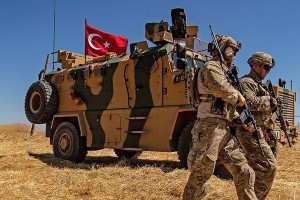
A revived conflict in Syria provides distraction from events in both Gaza and Lebanon. It also is a means by which both Hezbollah and Iran can be further drawn into exhausting resources.
It isn’t really possible to view these conflicts and equations anymore as being separate from each other.
Though, the equation might be even more complicated at this point in time. For example, Hamas was ideologically aligned with the anti-government groups in Syria – something that they and Hezbollah seem to have strangely agreed to disagree about.
And the fact that American-backed Kurdish forces have also attacked the Syrian Army in recent days – presumably designed to run parallel to the HTS attacks – is a little confusing too.
Because, with the Islamist militants being backed by Turkey, and Turkey’s main aim in Syria being to crush the Kurdish militias, why would the Kurdish SDF want to join in the assault on Syrian state forces?
Isn’t that allying with the enemy?
Or were Kurdish fighters being encouraged by Washington?
It seems somewhat ambiguous at this point.
Meanwhile the group credited for capturing Aleppo and Hama – ‘Hayat Tahrir al-Sham‘ – is simply a rebranded version of the al-Nusra.
It’s nice at least to see most Western media acknowledging that this is an Al-Qaeda affiliate, instead of pretending it’s some romantic, democracy-loving liberation army.
Western powers’ previous support for bloody armed groups in Syria backfired spectacularly in several ways – and was a massive propaganda misstep, especially in regard to the advent of ‘ISIS’.
So the support this time – at least in terms of open support – might not be the same.
But the idea that, after bleak years of brutal war, mass destabilisation, and cultural destruction, the Syrian crisis was now settled and a slow process of recovery could commence, was obviously naive.
That didn’t happen in Libya, even fifteen years now since the end of the Gaddafi era. Libya remains broken and entirely dysfunctional.
The problem with Syria is that it was never really restored. It simply remained a broken entity, divided up into zones of control.
As illustrated in this map, borrowed from the BBC website, Syria never became whole again after the fighting stopped. It was simply that the war went from hot to cold.
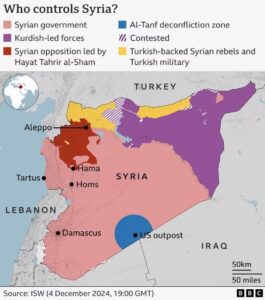
Turkey (illegally) occupies and controls parts. The Kurdish forces have their zone of control. The US maintained troops and resources in their spot. And that’s not even accounting for Iranian and Russian influence.
Or the fact that Israel occupies the Syrian Golan Heights. Or that the Israelis have continued conducting operations into Syria whenever they’ve wished to.
You can’t rebuild a country or establish a workable peace framework under those conditions.
How would any move towards reconciliation or purposeful negotiation occur when anti-government militias are still being harboured in protected enclaves, or when foreign powers are still holding on to parts of your country and refusing to leave?
So, the Syrian conflict was never really resolved. It just entered a period of dormancy. And Syria as a state has never regained its sovereignty.
You could argue, as most Western commentators do, that the Assad-led regime is being cynically propped up by Russia and Iran.
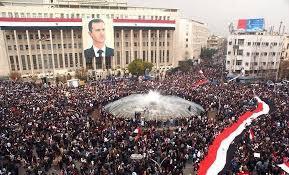
But the rebel groups have always been propped up by foreign entities too – and this latest turn of events is no exception.
So who can claim to have the legitimacy in Syria, if not the Syrian regime – as harsh or as bloodstained as that regime may be?
Where this goes from here remains to be seen.
It’s possible that some of the foreign sponsors that wholly supported and funded rebel militias previously may have lost their appetite for further entanglement with morally-dubious groups.
The likes of Saudi Arabia, Qatar and the Gulf States might be less enthusiastic now.
If the likes of the US, Britain and Western powers, however, see the Syrian arena as part of the proxy-based conflict with Russia – especially in the context of a waning Ukraine war – then the possibility of a prolonged return to conflict seems possible.
If Israel too sees war in Syria as a component of its conflict with Iran and Hezbollah, then a renewed Syrian bloodshed would align with its regional agenda.
Which isn’t promising.
In a worse case scenario, a countrywide war could be reignited.
Conditions could also pave the way for a revival of the Islamic State group in Syria: despite its apparent and possibly deceptive collapse.
The US has recently been bombing reported Islamic State positions in Syria. But it has also been bombing Iranian-linked sites in Syria as recently as three weeks ago: indicating, again, that Syria is very much seen as a front in Israel and the United States’ conflict with Iran.
Israel too has been frequently launching attacks against Iranian targets in Syria: the recent pager attacks in fact included targets in Syria and not just Lebanon.
Demonstrating – as has been the case for almost a decade now – that Syria is no longer seen as a sovereign state with a right to self-determination or a right to the privileges of international law.
While various Western and international media commentators are now pontificating over whether Damascus itself could fall this time, it’s worth considering that a full regime collapse in Syria might not even be the objective.
Rather, it’s very possible that what’s envisioned is a more permanent carving up or Balkanisation of Syria into mini states or permanent zones of control.
This would be in keeping with several previous geo-political visions: including the Neo-Con ‘Clean Break’ strategy (originating with Benjamin Netanyahu in 1996 and clearly the blueprint for all US actions in the Middle East since), and crucially, Israel’s ‘Yinon Plan‘.
And, given Israel’s current ethnic cleansing of Gaza and its broader and increasingly more overt ‘Greater Israel’ vision, a forced breaking up of Syria could conceivably play into that.
Again, Syrians themselves – both as a state and as a culture – aren’t the ones who’ll get to decide what happens.
The loss of Aleppo specifically seems very symbolically notable, given both the prolonged hardship and bloodshed that characterised the battle for the historic city several years ago (as well as the interminable international propaganda war), and the celebrations that followed its liberation.
In particular, the first post-war Christmas celebrations in the then freshly liberated Aleppo several years ago seemed to symbolise a restoration of normal cultural life – and was an image that seemed to resonate.
As this year’s Christmas approaches, one can’t help think back to those scenes: and hope that this ravaged country and culture isn’t going to be dragged back into an abyss.
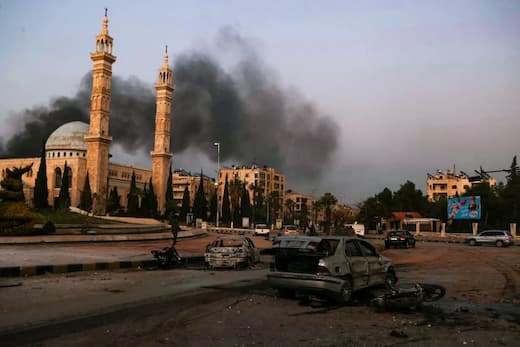


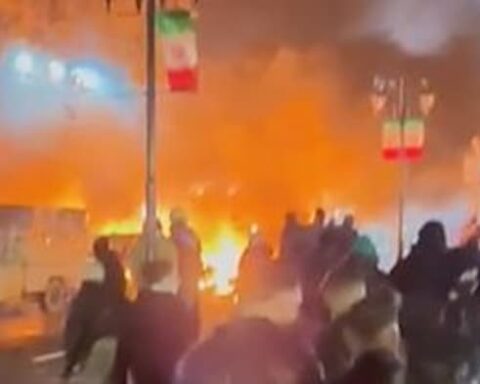

Like you I am just left bamboozled by the sheer speed of the collapse and the lack of resistance from both Russia and Iran. Especially as Russia still has its air and naval bases in the West. Is it now going to make a humiliating exit from the country? That would be seen as a shattering blow to its international prestige. But more significantly at this moment, with Hezbollah fucked as you say, any remaining hopes for Palestinian resistance seem to have been ruined. It’s all so shocking actually, and saddening. And what will happen next to the people of Syria and Lebanon as Israel doubtless intensifies this regional war?
I just ran across this interview featuring Mohammad Marandi speaking with Nima Alkhorshid on his “Dialogue Works” YT channel (which is currently running live) that maybe gives some better inside perspective on the Iranian position:
https://www.youtube.com/watch?v=uFcf0LUyQkA
It looks like “the moderate rebels” aka HTS aka al-Nusra aka Al-Qaeda may now have captured Homs, which in turn may mean the battle for Damascus is effectively over. I heard Kevork Almassian (Syriana Analysis) say that if Homs falls then it is 90% certain that Damascus will fall too. Disastrous for Syria and the region. What I still do not understand is why the Russians and Iranians did step up to stop this as the columns of jihadists drove across a desert. Why has Syria suddenly been abandoned to these terrorist militia? I mean Erdogen’s role is all-too-obvious. Likewise Israel’s hand. But Kevork says he saw this attack being prepared months ago. I understand that he worte about it at the time. Vanessa Beeley certainly wrote about this possibility back in October. That means Damascus was asleep at the wheel then? And also Iran? And Russia too? The levels of incompetence seem quite extraordinary to be honest. I find it gobsmacking what has happened and deeply saddening. It marks not only the end of a secular state in Syria but the final nail in the coffin for the Palestinians. And most sickening of all, many of the liberals are turning a blind eye or even cheering “the rebels”. Truly a horrible time in history.
I’m kind of lost for words at this point. Simultaneous fronts in Gaza and Lebanon; so sure, why not reignite Syria too? As the time I’m writing this reply here, I’m hearing Damascus has fallen fully. It’s reminding me a little of the fall of Tripoli in 2011. Nothing good ever came of that, even fifteen years later.
You’re right to ask about Russia. Hezbollah is fucked, so that’s one thing. But has Russia made some kind of unofficial agreement with Turkey or something? If it was so important to maintain and defend the Syrian state for 15 years, why has that changed?